Exam 3: Interdependence and the Gains From Trade
Exam 1: Ten Principles of Economics455 Questions
Exam 2: Thinking Like an Economist643 Questions
Exam 3: Interdependence and the Gains From Trade547 Questions
Exam 4: The Market Forces of Supply and Demand693 Questions
Exam 5: Elasticity and Its Application626 Questions
Exam 6: Supply, Demand, and Government Policies668 Questions
Exam 7: Consumers, Producers, and the Efficiency of Markets547 Questions
Exam 8: Applications: the Costs of Taxation509 Questions
Exam 9: Application: International Trade521 Questions
Exam 10: Externalities543 Questions
Exam 11: Public Goods and Common Resources452 Questions
Exam 12: The Design of the Tax System664 Questions
Exam 13: The Costs of Production649 Questions
Exam 14: Firms in Competitive Markets604 Questions
Exam 15: Monopoly662 Questions
Exam 16: Monopolistic Competition649 Questions
Exam 17: Oligopoly522 Questions
Exam 18: The Markets for the Factors of Production592 Questions
Exam 19: Earnings and Discrimination511 Questions
Exam 20: Income Inequality and Poverty478 Questions
Exam 21: The Theory of Consumer Choice570 Questions
Exam 22: Frontiers in Microeconomics461 Questions
Exam 23: Measuring a Nation S Income547 Questions
Exam 24: Measuring the Cost of Living565 Questions
Exam 25: Production and Growth527 Questions
Exam 26: Saving, Investment, and the Financial System637 Questions
Exam 27: Tools of Finance534 Questions
Exam 28: Unemployment and Its Natural Rate701 Questions
Exam 29: The Monetary System540 Questions
Exam 30: Money Growth and Inflation504 Questions
Exam 31: Open-Economy Macroeconomics: Basic Concepts540 Questions
Exam 32: A Macroeconomic Theory of the Open Economy511 Questions
Exam 33: Aggregate Demand and Aggregate Supply572 Questions
Exam 34: The Influence of Monetary and Fiscal Policy on Aggregate Demand523 Questions
Exam 35: The Short-Run Tradeoff Between Inflation and Unemployment536 Questions
Exam 36: Six Debates Over Macroeconomic Policy354 Questions
Select questions type
It takes Heather 1 hour to change the oil in the car and 20 minutes to do the dishes. It takes Zach 1.5 hours to change the oil in the car. For Zach to have a comparative advantage changing the oil it must take him more than ______ minutes to do the dishes.
(Short Answer)
4.7/5  (32)
(32)
Figure 3-22
Alice and Betty's Production Possibilities in one 8-hour day.
Alice's Production Possibilities Frontier
Betty's Production Possibilities Frontier 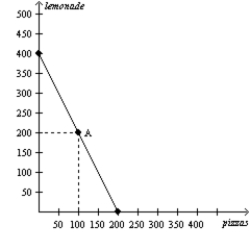
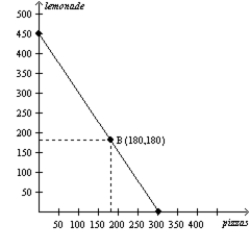 -Refer to Figure 3-22. What are Alice and Betty's opportunity costs of 1 pitcher of lemonade?
-Refer to Figure 3-22. What are Alice and Betty's opportunity costs of 1 pitcher of lemonade?
(Multiple Choice)
4.9/5  (35)
(35)
The principle of comparative advantage states that, regardless of the price at which trade takes place, everyone will benefit from trade if they specialize in the production of the good for which they have a comparative advantage.
(True/False)
4.8/5  (29)
(29)
Table 3-25
Assume that Maya and Miguel can switch between producing mixers and producing toasters at a constant rate.
 -Refer to Table 3-25. The opportunity cost of 1 mixer for Miguel is
-Refer to Table 3-25. The opportunity cost of 1 mixer for Miguel is
(Multiple Choice)
4.9/5  (34)
(34)
Figure 3-14
Arturo's Production Possibilities Frontier
Dina's Production Possibilities Frontier 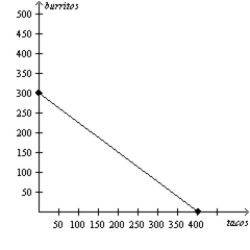
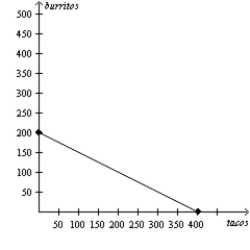 -Refer to Figure 3-14. Without trade, Arturo produced and consumed 240 tacos and 120 burritos and Dina produced and consumed 100 tacos and 150 burritos. Then, each person agreed to specialize in the production of the good in which they have a comparative advantage and trade 260 tacos for 156 burritos. As a result, Arturo gained
-Refer to Figure 3-14. Without trade, Arturo produced and consumed 240 tacos and 120 burritos and Dina produced and consumed 100 tacos and 150 burritos. Then, each person agreed to specialize in the production of the good in which they have a comparative advantage and trade 260 tacos for 156 burritos. As a result, Arturo gained
(Multiple Choice)
4.7/5  (36)
(36)
Figure 3-11
The graph below represents the various combinations of ham and cheese (in pounds) that the nation of Bonovia could produce in a given month. 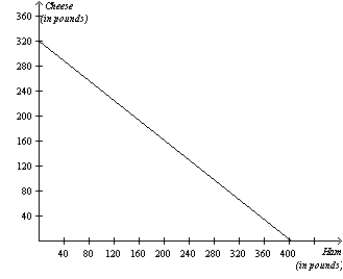 -Refer to Figure 3-11. If the production possibilities frontier shown is for 240 hours of production, then which of the following combinations of ham and cheese could Bonovia produce in 240 hours?
-Refer to Figure 3-11. If the production possibilities frontier shown is for 240 hours of production, then which of the following combinations of ham and cheese could Bonovia produce in 240 hours?
(Multiple Choice)
4.9/5  (34)
(34)
Table 3-41
 -Refer to Table 3-41. What is Russia's opportunity cost of one radio?
-Refer to Table 3-41. What is Russia's opportunity cost of one radio?
(Short Answer)
4.7/5  (38)
(38)
Table 3-41
 -Refer to Table 3-41. What is England's opportunity cost of one compass?
-Refer to Table 3-41. What is England's opportunity cost of one compass?
(Short Answer)
4.8/5  (41)
(41)
Which of the following statements about comparative advantage is not true?
(Multiple Choice)
4.8/5  (33)
(33)
Figure 3-23
The graph below represents the various combinations of ham and cheese (in pounds) that the nation of Bonovia could produce in a given month. 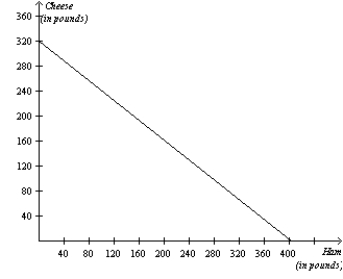 -Refer to Figure 3-23. In the nation of Cropitia, the opportunity cost of a pound of ham is 0.3 pounds of cheese. Bonovia and Cropitia both can gain from trading with one another if one pound of ham trades for
-Refer to Figure 3-23. In the nation of Cropitia, the opportunity cost of a pound of ham is 0.3 pounds of cheese. Bonovia and Cropitia both can gain from trading with one another if one pound of ham trades for
(Multiple Choice)
4.9/5  (25)
(25)
If the U.S. could produce 5 televisions per hour of labor and China could produce 3 televisions per hour of labor, would it necessarily follow that the U.S. should specialize in television production?
Explain your answer using the concepts of comparative and or absolute advantage.
(Essay)
4.9/5  (34)
(34)
It is possible for the U.S. to gain from trade with Germany even if it takes U.S. workers fewer hours to produce every good than it takes German workers.
(True/False)
4.8/5  (35)
(35)
Figure 3-15
Perry's Production Possibilities Frontier
Jordan's Production Possibilities Frontier 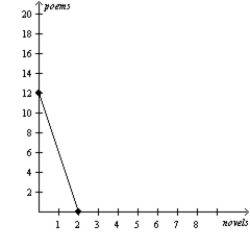
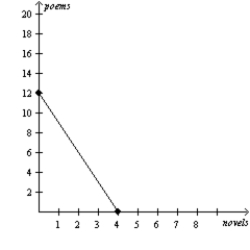 -Refer to Figure 3-15. If Perry and Jordan switch from each person dividing their time equally between the production of novels and poems to each person spending all of their time producing the good in which they have a comparative advantage, then total production of novels will increase by
-Refer to Figure 3-15. If Perry and Jordan switch from each person dividing their time equally between the production of novels and poems to each person spending all of their time producing the good in which they have a comparative advantage, then total production of novels will increase by
(Multiple Choice)
4.7/5  (44)
(44)
Trade allows a country to consume outside its production possibilities frontier.
(True/False)
4.8/5  (34)
(34)
Absolute advantage is found by comparing different producers'
(Multiple Choice)
4.9/5  (37)
(37)
Table 3-24
Assume that England and Spain can switch between producing cheese and producing bread at a constant rate.

-Refer to Table 3-24. England should specialize in the production of
-Refer to Table 3-24. England should specialize in the production of
(Multiple Choice)
4.9/5  (29)
(29)
Figure 3-18
Bintu's Production Possibilities Frontier
Juba's Production Possibilities Frontier 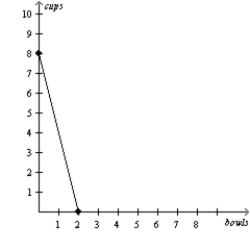
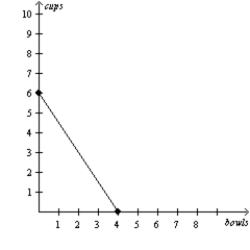 -Refer to Figure 3-18. Bintu has a comparative advantage in the production of
-Refer to Figure 3-18. Bintu has a comparative advantage in the production of
(Multiple Choice)
4.9/5  (32)
(32)
Showing 41 - 60 of 547
Filters
- Essay(0)
- Multiple Choice(0)
- Short Answer(0)
- True False(0)
- Matching(0)